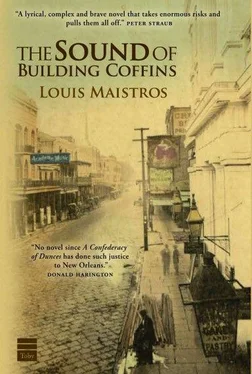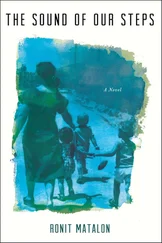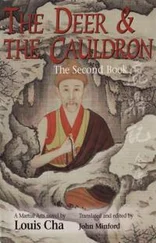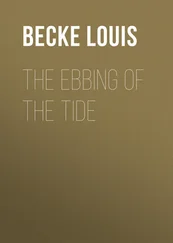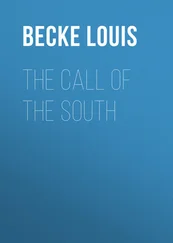Typhus threw some sticks on the fire, watched them turn white beneath the weight of orange flame.
He crawled onto the large, straw-stuffed mattress between his brother and sister. Found his homemade pillow; his own multi-purpose invention. The little burlap sack was originally constructed to hold coffee beans, but could also be stuffed with straw for sleeping-or filled with unborn babies for transporting and water-birthing. He held it tight to his face and smelled the river in it. He reached over and stroked the hair of Dropsy. It helped a little.
Typhus Morningstar did not sleep, but he did dream.
Although he knew disobeying his father would yield consequences, he emptied the contents of the pillow at the foot of the bed and stood up. Went outside without benefit of light, carrying the empty all-purpose sack with him. He sensed he might need it.
Found his bike in the dark.
Chapter four. Dominick’s Affliction
Caught in the dank grip of an unusually warm October, the City of New Orleans had already been on edge and looking for a fight when the murder of Police Chief David Hennessey brought things from a simmer to a boil in the fall of 1890.
Eighteen Sicilian immigrants were arrested that October, but not until March of 1891 did eleven of them stand trial. The trial itself had been a fiasco; peppered with threats and assaults on witnesses, jury tampering and more, leading to two dismissals for lack of evidence, six found not guilty, and three released through benefit of a hung jury. The acquitted men were scheduled for release on the following afternoon, but such reasonable resolution was pre-empted by an open letter that appeared in the morning edition of The Daily Picayune. Penned by the Mayor of New Orleans himself, the letter was, in essence, a thinly veiled call to arms against the soon-to-be-freed defendants.
Within hours of the paper’s arrival at newsstands, an initial crowd of five thousand assembled at Clay Statue, where a host of dignified speakers eloquently whipped mild hearts into murderous lather. By noon the mob had made its way to the prison at Congo Square, its eventual number surpassing twenty thousand.
At Congo Square, a group of seven professional bounty hunters (employed, it was rumored, by the cronies of Mayor Shakespeare himself) enlisted an unfortunate prison guard by the name of Beauregard Church to act as their guide, at gunpoint, through the lightless jail. The vigilantes soon selected eleven victims; eight shot down on prison grounds and three dragged into the square to be hanged for the amusement of the mob. One of the hanged men, Antonio Carolla, appeared already dead-perhaps from fright-when the men placed the noose around his neck.
In effect, eleven men-whose guilt or innocence was never established-were tried, convicted, and executed by the local press and the Mayor of New Orleans.
***
Marshall Trumbo, a good man in his heart and by his nature, found himself deeply burdened by his own role in the slaughter of the Sicilians. A reporter for the New Orleans Item , Trumbo knew that to stir racial tensions in the sweltering city would be a reckless act-still, he had forged ahead with the rest and now lived with his guilty heart. But on the day after the massacre, Trumbo believed he’d found potential hope for redemption in the form of a sick child.
The one-year-old son of the twice-murdered Antonio Carolla had contracted a mysterious illness on the afternoon of his father’s death. Hoping to lighten his conscience by somehow aiding the Carolla family in their darkest hour (and perhaps simultaneously satisfying his employer’s thirst for saleable melodrama), Trumbo took to the home of the boy and his mother with pen and paper in hand.
Trumbo’s gallant mood sank sharply upon his arrival. The boy was tiny and thin and the color gone from him, his eyes closed tight, an unnerving grin stretching his lips nigh ear to ear. It was explained to Trumbo by the doctor in attendance-who applied leeches to the child’s torso with appalling calm-that the grin was merely a contortion brought on by recent fits of convulsion.
Due to the child’s apparently dire condition, several men of the cloth had been called to the home since the day before-all staying briefly and leaving abruptly. The man of God currently in residence was one Trumbo knew from a prior assignment, a Baptist minister called Noonday Morningstar.
As Father Morningstar droned out a verse from his open Bible, the boy’s eyes shot open with fear or rage or a mixture of the two. Trumbo thought he heard the child whisper something angrily at Morningstar. In apparent response, the preacher shut his Bible, crossed himself, then exited quickly, mumbling something about a forgotten prior commitment. While the doctor fiddled diligently on with his collection of leeches, Trumbo followed after Morningstar-supposing the preacher had made some private spiritual diagnosis.
Moving up quietly from behind, Trumbo placed a hand on Morningstar’s shoulder; the unexpected touch causing the taller man to spin around with a gasp. Trumbo apologized for spooking him, then got right to the point.
“Pardon me, Father, but please tell me what you saw in that house that has alarmed you so.” Morningstar at once pulled back, then took a breath and seemed to relax. Before speaking, he looked around to see if anyone else was close enough to hear.
“You a newspaper man, sir?” His voice was low and gentle.
“Yes, Father Morningstar. Trumbo’s my name-I have interviewed you in the past if you will recall, regarding the sharp increase in cholera deaths last year. But you have my word that I will keep whatever it is you tell me today in the strictest confidence if you so wish.”
“I don’t believe that for one minute, sonny,” the preacher said with a thin smile.
“I understand, Father.” Trumbo’s tone softened. “It’s true that I came here for a story, but after what I’ve seen-I just want to help.”
Morningstar’s demeanor softened in kind.
“You seem like a nice boy,” he said. “Do yourself a favor and stay out of that house. Those doctors can’t help that young ’un. Neither can I. There’s something wild in there. Something dangerous to the souls of men. Something absent of God-or too full of God. Stay away from that place, Mister Reporter. There’s no story in there. Only death.” He turned to leave.
“If you are a man of God, sir-”
Morningstar stopped but did not turn to meet the reporter’s eyes.
“If you are a man of God-how can you leave that young child’s soul in danger, as you say?”
Morningstar’s eyes then met Trumbo’s-and there was ice in the connection. “That boy’s soul is lost, sonny. This is God’s business now.”
“But isn’t your business God’s business?”
The preacher stepped close-allowing Trumbo’s full appreciation of his larger stature. His voice remained low and even:
“Sonny, I hear the voice of God every day of my life. Sometimes every minute of every day. Sometimes I wish the Good Lord would shut the hell up and leave me alone. But I answer his call, and I do his bidding. It is my lot.”
An awkward pause balanced in midair between the two. After a few moments he continued:
“Sonny, listen to me. When I was in that place I did indeed hear the voice of Jesus Our Savior. Would you like to know what He said?”
Incredulous, Trumbo answered, “I would indeed.”
“The Good Lord said, ‘Get the fuck out of this house. Now.’ Print that in your damn paper.” He left without another word.
Finding himself unable to follow Father Morningstar’s sensible example, Trumbo walked back to the house on shaking legs-and entered on an appalling scene.
Читать дальше
